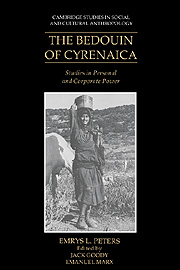Book contents
- Frontmatter
- Contents
- List of illustrations
- Foreword by Jack Goody
- Preface
- Introduction by Emanuel Marx
- 1 The Sanusi order and the Bedouin
- 2 The Bedouin way of life
- 3 The tied and the free
- 4 Aspects of the feud
- 5 Proliferation of segments
- 6 The power of shaikhs
- 7 Debt relationships
- 8 Family and marriage
- 9 Bridewealth
- 10 The status of women
- Notes
- Bibliography
- Index
- Cambridge Studies in Social and Cultural Anthropology
- Plate section
6 - The power of shaikhs
Published online by Cambridge University Press: 02 December 2009
- Frontmatter
- Contents
- List of illustrations
- Foreword by Jack Goody
- Preface
- Introduction by Emanuel Marx
- 1 The Sanusi order and the Bedouin
- 2 The Bedouin way of life
- 3 The tied and the free
- 4 Aspects of the feud
- 5 Proliferation of segments
- 6 The power of shaikhs
- 7 Debt relationships
- 8 Family and marriage
- 9 Bridewealth
- 10 The status of women
- Notes
- Bibliography
- Index
- Cambridge Studies in Social and Cultural Anthropology
- Plate section
Summary
The data in this discussion relates to the three years immediately preceding Libyan independence in 1951. Prior to the advent of the British, Cyrenaica had been under Italian colonial rule from the Italian invasion in 1911 until Italy entered World War II in 1940. For the first twenty years of this rule the Bedouin were at war with the Italians, until they were subdued by Graziani and the resistance brought to an end by the capture and hanging, on 16 September 1931, of the redoubtable but aged resistance leader, ʿUmar al-Mukhtar. After the Italians had been expelled from Cyrenaica in 1943, the country was governed first by a British Military Administration, and then, from early 1948, by a Civil Administration. The main preoccupation of both administrations was to ensure that a minimum of order prevailed throughout the country, especially in the few small towns and villages, as they were then. The Civil Administration had the additional task of preparing for independence, and in 1948 a Four Power Commission arrived in the country to take evidence of political conditions, to be followed by a United Nations Council in 1950, led by Adrian Pelt, to plan the details of the move to self-government for Libya.
For centuries before the Italians occupied Cyrenaica, the country had been a Turkish colony. The Turks, like the Italians, gave Bedouin shaikhs official recognition; the Turks adopting a form of indirect rule on a modest scale by using the few more powerful shaikhs as administrators, mainly for the purpose of collecting taxes; the Italians attempting the more ambitious scheme of giving official recognition to nominated shaikhs of different orders of importance and paid accordingly. The British experimented unsuccessfully with the idea of representatives nominated by the people of the tribes and their sections themselves.
- Type
- Chapter
- Information
- The Bedouin of CyrenaicaStudies in Personal and Corporate Power, pp. 112 - 137Publisher: Cambridge University PressPrint publication year: 1991



